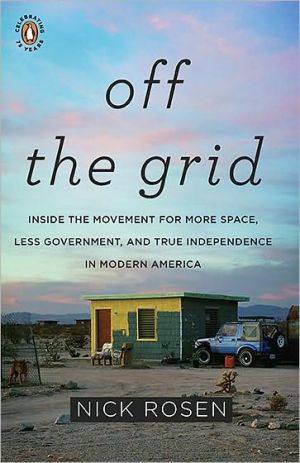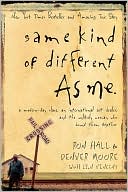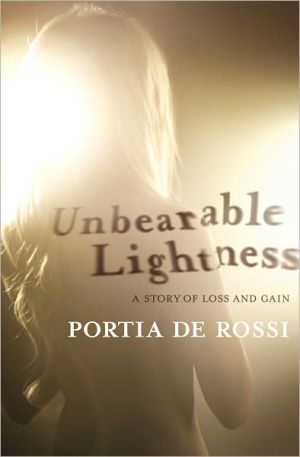Off the Grid: Inside the Movement for More Space, Less Government, and True Independence in Modern America
Inside the subculture of off-grid living\ Written by a leading authority on living off the grid, this is a fascinating and timely look at one of the fastest growing movements in America. In researching the stories that would become Off the Grid, Nick Rosen traveled from one end of the United States to the other, spending time with all kinds of individuals and families striving to live their lives the way they want to-free from dependence on municipal power and amenities, and free from the...
Search in google:
Inside the subculture of off-grid living Written by a leading authority on living off the grid, this is a fascinating and timely look at one of the fastest growing movements in America. In researching the stories that would become Off the Grid, Nick Rosen traveled from one end of the United States to the other, spending time with all kinds of individuals and families striving to live their lives the way they want to-free from dependence on municipal power and amenities, and free from the inherent dependence on the government and its far-reaching arms. While the people profiled may not have a lot in common in terms of their daily lives or their personal background, what they do share is an understanding of how unique their lives are, and how much effort and determination is required to maintain the lifestyle in the face of modern America's push toward connectivity and development. The Washington Post - Lisa Bonos …[Rosen's] book functions more as a documentary than a soapbox, bringing readers of all stripes into a quirky subculture in which people cut themselves off from more than their utility companies. For all its rejection of traditional American society, this self-reliant entrepreneurial existence is genuinely American.
1 Another Way 1Joining the Freedom Movement 82 How the Grid Was Won 17Dawn of the Grid 22Down-home Electric Co-ops 33The Edison Electric Institute 36Central Water and Conflict 393 My Other Place Is on the Grid 47For the Man who Has Everything 52No Name Key 55No Math Island 754 Stepping Away 83Writer in the Woods 85The Polite Anarchists 93Virtual Springfield 96A Walden Wedding 1005 Reinventing the American Dream 103The Wild, Wild West 104A Sad Tale 111Anti-nuclear Family 116Ranch Styles of the Rich and Famous 1226 Coping with the Crash 127A Better Life 127Genius or Charlatan? 138This Way Madness Lies 1497 Running from the Rat Race 155The Mountain Hermit 1648 Post-consumer Society 171The Gift Economy 173Local Currencies and Car Sex 176Max's Pot 182The Sultan of Scrounge 1849 Power and Freedom 193The Last American Man 200On the Road Again 21210 Closer to God 219Stairway to Heaven 221Howling in the Woods 232The Neo-Pagans 23711 Under the Radar 241Sacrament Stories 242Take Back the Land 246Rainbow People-NO2ID 250Pot-growing Neighbors 253The Valley Girl 256Building Without a Permit 259The Non-identity 26112 Fear 263Life's a Beach 265The Bugout Palace 272Only Disconnect 27613 Getting There 281Why It Matters 281Acknowledgments 293
\ Publishers WeeklyFed up with "the hyper-consumption of the past thirty years, the pointless acquisitions, the hopeless materialism, and the obsession with celebrity trivia," British journalist and filmmaker Rosen sets out across the U.S. to find the perfect off-the-grid community "beyond the reach of the power cables and water lines that intersect the modern world." His journey brings him into contact with a colorful collection of rebels and outcasts--aging hippies, anarchist kids, a middle-aged couple with an "off-the-grid McMansion" in Colorado--and he sprinkles his tale with the sorts of practical tips likely to appeal to anyone considering a similar adventure: the Clivus Multrum is "the Hummer of composting toilets." What Rosen lacks is a knack for storytelling; he would have done well to step back and let his subjects speak for themselves. Instead, he constantly inserts himself into the frame and insists on passing humorless judgment on nearly everyone he meets (and a fair number of people he doesn’t), and even whole cities are roundly dismissed (Boulder is "the smuggest town in America"). His curmudgeonly asides are off-putting, and it’s disappointing to see the book’s idealism and noble reach devolve into grousing. (Aug.)\ \ \ \ \ Mother JonesJournalist Nick Rosen profiles the brave souls who live sans electricity bill, from the predictably fringe-ish (9/11 Truther survivalists, old-order Mennonites) to the surprisingly ordinary: A Colorado mom explains that off-grid living is the only way she can afford to raise her kids "where neighbors are neighborly, and there is plenty of clean air." Thoreau couldn't have said it better himself, and luckily Rosen knows it. Off the Grid makes a convincing case for living deliberately, without too many Waldenisms.\ \ \ The Los Angeles TimesNick Rosen sees going off the grid as a political choice. In "Off the Grid: Inside the Movement for More Space, Less Government, and True Independence in Modern America," he writes that corporate greed, massive layoffs, healthcare wars, ecological disasters have caused many true believers to question the American Dream. "Most of the people I met on my tour of America," writes the British Rosen, "are losing faith in the grid, both in its literal and metaphorical sense. They don't feel a sufficient advantage to being inside the fabric of society." … He travels across the U.S. visiting individuals, families and communities that have chosen to live free of the "Meter Man." He distinguishes between the back-to-the-landers, the hippies, the anarchists and the survivalists and writes about the issues they face as they go off-grid — zoning problems, permits and social ostracism.\ \ \ \ \ Kirkus ReviewsA British journalist's account of Americans who have fled the mainstream to pursue marginal lifestyles. Rosen initially defines off-gridders as people who are not connected to public utilities, estimating that there are now some 500,000 off-the-grid houses in the United States. He then expands his definition to include anyone fleeing "the system" as a whole, quite apart from their connections to local power grids and water supplies, and even includes individuals without online or cell-phone access. The author's wishy-washy debut celebrates the unusual lifestyles of a bewildering variety of individuals, including middle-class environmentalists, right-wing survivalists, victims of foreclosure, long-term marijuana growers, people living in cars and vans and business executives with their own islands. In a cross-country trip, Rosen visited dozens of off-gridders, including a couple in Springfield, Mass., who light their mortgaged home with candles, grow their own fruits and vegetables, sell honey and home-school their children; an 80-year-old New Mexico pothead who owns a cabin, a solar panel and an outhouse; an award-winning former PBS cameraman who works part-time in a thrift store and leads a contemplative life; and residents of solar-powered communities like No Name Key, Fla., and Earthaven ecovillage outside of Asheville, N.C. The author provides vignettes on such well-known individualists as impoverished Maine author Carolyn Chute and outdoorsman Eustace Conway, subject of Elizabeth Gilbert's The Last American Man (2002). Tracing the popularity of simple living to the 1970s back-to-the-land-movement, Rosen says off-gridders share "a fierce resistance to convention and a pioneering spirit." They are generally motivated by one or more concerns: distrust of government and bankers; fear of an impending economic collapse; desire to flee the rat race; and anger over pollution, consumerism and traffic. The author writes that people living off the power grid can now generate electricity cheaply and safely with the help of new technologies and low-energy appliances. Briskly written but scattershot.\ \ \ \ \ Lisa Bonos…[Rosen's] book functions more as a documentary than a soapbox, bringing readers of all stripes into a quirky subculture in which people cut themselves off from more than their utility companies. For all its rejection of traditional American society, this self-reliant entrepreneurial existence is genuinely American.\ —The Washington Post\ \








